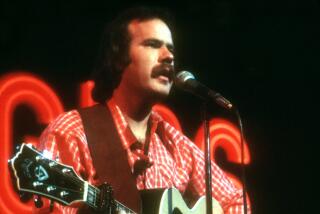Denver Leaves Legacy Larger Than Music
- Share via
John Denver was so warmly embraced by middle America in the 1970s that he was probably the only figure in contemporary pop who could sing about getting high and convince you he was referring to the beauty of the Rocky Mountains.
It was, in fact, the relentlessly optimistic nature of Denver’s songs about homespun values and the wonders of nature that led the singer-songwriter to be both beloved and ridiculed.
His “farrr-out” exclamations on TV talk shows and his “Thank God, I’m a Country Boy” enthusiasm caused fans to cheer and detractors to grit their teeth.
The tender irony of his life--which ended in a plane crash Sunday in Monterey Bay--is that a man who was often dismissed as calculating and superficial may eventually be remembered as a man of high integrity and idealism.
Denver not only left us a legacy of hit songs but also a history of personal commitment that echoed the highest ideals of his music. Even when the superstar days were long behind him, he continued to work tirelessly for such concerns as world hunger and the environment.
He served on the Presidential Commission on World and Domestic Hunger and supported the World Wildlife Fund, and he donated song royalties to UNICEF. He also co-founded a nonprofit environmental education center.
Jerry Weintraub, who managed Denver before becoming a movie producer, saw the superstar potential of the artist as soon as Denver emerged during the counter-culture environment of the folk music scene.
“Critics may not like him, but he’s going to be the biggest star in America,” he told me the night Denver opened at West Hollywood’s Troubadour in 1970. “Of all the singer-songwriters, he’s the one that people will feel comfortable with . . . and invite into their living rooms.”
Weintraub was right on both counts.
There was a purity and grace in Denver’s best songs, including “Follow Me” and “Back Home Again,” that was as cleansing as the mountain air and ocean waves that he loved.
But there was also a syrupy, sentimental quality to many of his other songs, and this ultimately led critics to brand him as one-dimensional. He was dubbed “Mr. Clean” by those who insisted nobody could be as upstanding as the sentiments in his songs. And there were dark moments in Denver’s life, including the breakup of his first marriage and two arrests in the ‘90s on charges of drunk driving.
Yet, as Weintraub predicted, the public did accept Denver into their living rooms and their hearts. Thanks to such hits as “Take Me Home, Country Roads,” he became, for a while in the ‘70s, the hottest record artist in America.
Denver never apologized for his upbeat approach.
“People can pick up the papers or turn on the television or go to the movies and see all the crap that is going on . . .,” he said in 1978. “It’s easy to get caught up and think that’s all there is in the world. . . . I’m trying to balance it. But that’s my inclination. It’s not something I tried to manufacture.”
Weintraub hasn’t managed Denver since the early ‘80s, but he was devastated by the singer’s death.
Asked Monday what he would say to either a Denver fan or a Denver critic, Weintraub replied, “I would say the same thing: Listen to the music again now.
“The thing John used to always say to me was, ‘I really don’t have to do interviews or say anything because my music speaks for me. . . .’ And it still does. There was a lot more depth to this man and his music than he ever received credit for. . . . He was someone who believed everything he sang.”
More to Read
The biggest entertainment stories
Get our big stories about Hollywood, film, television, music, arts, culture and more right in your inbox as soon as they publish.
You may occasionally receive promotional content from the Los Angeles Times.









